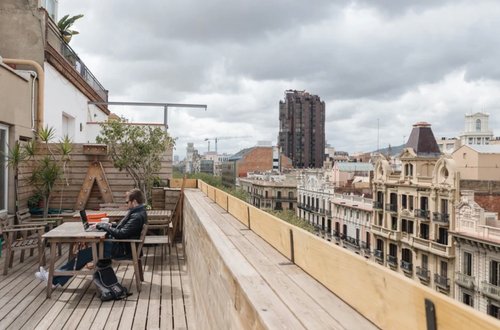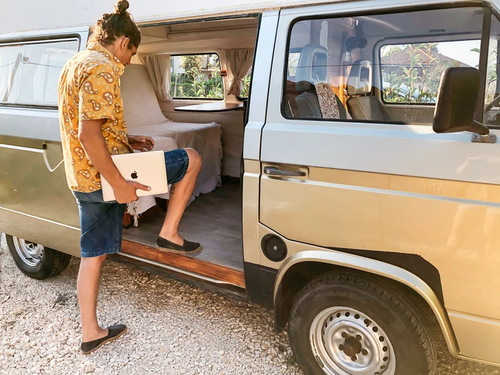Stop buying and start living lightly – and remotely
Oct 19, 2023
6 mins


Is this the first generation in recent history that can live without possessions? We are not talking about getting by or surviving without the burden of too much stuff, since the poor have always done that, but about truly thriving. At a time when more and more people cannot reach the kind of financial independence that their parents’ generation enjoyed, does the answer lie in embracing their status? Perhaps there is a good reason why subscription services are increasingly popular in this age of economic instability.
We talk about young people today having freedom of opportunity as they share apartments with each other, stay in college for longer to study for advanced degrees, or take to the road as digital nomads. They can have children much later – or not at all. They can travel more easily and more cheaply too. They can have experiences that their parents couldn’t enjoy until much later in life.
But the world is ever-changing, and everything can be looked at in two ways. A car is no longer a status symbol, and the money that once went on a vehicle is now spent on leisure because public transport, an e-scooter or an e-bike are often enough to get around. In a changing and fluid world, both in terms of our working lives and our personal relationships, a mortgage isn’t something that many people want to be tied to for 20 to 40 years.
All of these factors, paired with the uncertainty caused by interest rate hikes, low salaries or outstanding student debt, have made for a set of circumstances that have come earlier than expected. Our need for freedom, combined with the tough economic climate, is pushing us to embrace new types of subscription services. In the same way that working remotely became the norm during the pandemic as the world ground to a half, so too has the use of such services.
Doing business online, travelling (and living) offline
Today, it’s estimated that 35 million people work worldwide as digital nomads. Among those is Bosco Soler. An architect by training, he is an entrepreneur and nomad by nature who lived on Bali in Indonesia for a while before the island became so popular with remote workers.
Soler created Spain’s first online coworking space (sinoficina.com) with the aim of bringing freelancers from around the country together on a single platform, where not only would they not feel alone, but where they could interact first on the platform and then in person. Today, with a community of close to 1,000 people, he and his partner handle the needs of the constantly growing group, including offering training and networking events.
What’s key is that they can do this from anywhere and under almost any circumstances. That’s why, in April 2023, they decided to embark on a six-month trip. They had a few stops in mind but no obligatory ones and no fixed schedule. They’ve already traveled through the south of France, Albania, Greece and Macedonia. And wherever they’ve been, they’ve always had whatever they needed to live and work.
Owning fewer possessions and, where viable, keeping down his carbon footprint is important to Soler. “We did buy a car, yes. And we’re aware of the pollution that it produces. But we decided to do the trip this way because we believed that taking flights would have a worse impact,” he said. “It’s true that we considered renting or hiring a vehicle, but ultimately, we opted to buy one because its intended future use made owning one more cost-effective.”
Soler is also a minimalist. Until he was 36, his €2,000 ($2,140) laptop was the most expensive thing he owned. “Both on this trip and the two months we spent in the US and Canada after getting married, we rented through AirBnB and Booking, and we signed up to gyms in the towns where we spent more time, such as in Thessaloniki,” he adds.
The rise of the subscription economy
In the age of Netflix and Spotify, bypassing ownership has become the norm. Why buy a CD or a film when you can have access to all the entertainment in the world online for less? The subscription economy is expected to be worth nearly $200 billion in 2023, with compound annual growth of 64.4%. Experts predict the sector will hit $1 trillion by 2027 in the US alone. These figures are reflected in the 2023 Subscription Commerce Industry Outlook Annual Report, published by the Subscription Trade Association (Subta) in partnership with ATTEST, a research platform which, thanks to its technology, can survey 125 million consumers from across 58 countries.
In the first quarter of 2023, most American adults were active subscribers: 95.8% of consumers have at least one subscription. Streaming services take the top spot, followed by digital services and brand memberships.
What this highlights is that, in the face of uncertainty for the global economy and personal finances, flexible payment systems look attractive to more and more people. It’s expected that nearly 40% of consumers will take advantage of the option to buy/subscribe now and pay later. Or, simply put, they will opt to make savings through a subscription option, which they can cancel at will.
It’s a win-win too. This business model helped Amazon to generate more than $9 billion in revenue in 2022. In this new ecosystem, options are springing up which have not been common since the 1980s. One such example is being able to pause payment when something’s not needed or to simply pay per use. This is the case with Homie, a brand that allows you to rent a washing machine or dryer for as long as you need one.
So how do brands reach potential customers? Where do they look for them? The study mentions three main social channels: Instagram, YouTube and Facebook. This leads us to consider two issues. The first is the age range of the people viewing these offers, which in the case of the first two platforms is mainly those under 30. The second is whether young people or older adults are embracing this model. In the former case, due to low wages or a lack of motivation. And in the latter, due to the education received around accumulating possessions as a financial safety net.
Remote towns, sustainable economies
Returning to the issue at hand, lower consumption implies increased sustainability – especially in times when climate change has accelerated dramatically. So the growing number of digital nomads and their purchasing patterns are starting to become a force for setting an example for the rest of society.
Over the past decade, people from around the globe have flocked to Nomad City in Las Palmas, Gran Canaria, which has been nominated as one of the world’s best cities for remote working.
Carlos Jonay Suárez has had an active role in the initiative. But, as an island resident, he also understands that each travel or purchasing decision has implications for the environment.
That’s why he developed the initiative Pueblos Remotos (Remote Towns), which as well as regenerating the economy in underpopulated or abandoned areas across the Spanish archipelago, also represents a firm commitment towards sustainability. This can be achieved by not moving around all the time, consuming locally-sourced products, using public transport and contributing to the ecosystem with both money and knowledge.
“We tried to think about how to steer the remote working movement towards broader gains,” he said. “We’re aware that many people will continue to buy or fly, because price still takes precedence over environmental awareness. But we explained that by staying for at least a month and hiring local goods and services, the positive impact would multiply.”
Living lightly by using services
Europe’s first platform to bring together a range of subscription products and services, Simplr was founded in 2020. Before launching, it secured investment of €4 million ($4.2 million) and had more than 50 employees working in its offices.
From its inception, it faced a challenge: Spanish consumers were used to buying what they wanted or needed, rather than renting or subscribing to a service. In addition, the market is a lot smaller than in the US. Over the years, however, the start-up has built an ecosystem which has allowed it to become the largest aggregator in its territory. It now offers a range of possibilities including cell phones, tablets, laptops, cars, motorcycles, bikes, agricultural machinery, furniture, electrical appliances, coffee, drinks, snacks, coworking spaces, and electricity and internet services.
However, it has had to pivot its messaging away from individual customers to companies. Now, on its website, it urges companies to embrace flexible, centralized, and circular asset consumption. It places significant importance on sustainability – a concept that is becoming its main theme.
However, this company proves that there are already options on the market that can help you to travel or even settle anywhere without needing to own anything. Brands now understand that day-to-day renting and canceling is a key for business model because new consumers have different circumstances. And, above all, we’re in the age of trying first and deciding (or even paying) later.
A free trial is one of the most valued perks for those wanting to experience a product or service for the first time – even more so than a discount, according to the 2023 Subscription Commerce Industry Outlook Annual Report. Studies show that customers have opted for nearly 35 million of them worldwide. However, conversion rates vary depending on the sector with entertainment being more successful (43.3% conversion rate) than consumer goods (34.3%). This still poses a challenge for a possession-free lifestyle.
A new era is upon us: even companies whose core business has been based on one-off sales of goods or services are tapping into the new customers that are emerging – or those who are already here.
Photo: Welcome to the Jungle
Follow Welcome to the Jungle on Facebook, LinkedIn, and Instagram to get our latest articles every day, and don’t forget to subscribe to our newsletter!

More inspiration: David Blay
Journalist, consultant in teleworking, lecturer and podcast host.

Can Moneyball help inspire a new era for human resources?
Let’s begin with two rather unusual starting points for these types of articles, both linked to the world of sport...
Jan 18, 2024

Is remote work the start of a new class struggle?
Flexible work is becoming an essential job perk, but where does that leave all the essential workers?
Jul 05, 2023

Are you too anxious to be a digital nomad?
Working from the peace and quiet of a Californian beach town may sound like just the change you need, but does it work for everyone?
Nov 08, 2022

WFH works—until you need to take time off
Studies have shown that people working from home have a tendency to prolong their working day. We feel guilty for “abandoning” our tasks...
Mar 29, 2022

A practical guide to hybrid working
Although each company, manager and worker is different and requires a different approach to the hybrid model, there is clear evidence on...
Feb 08, 2022
The newsletter that does the job
Want to keep up with the latest articles? Twice a week you can receive stories, jobs, and tips in your inbox.

Looking for your next job?
Over 200,000 people have found a job with Welcome to the Jungle.
Explore jobs